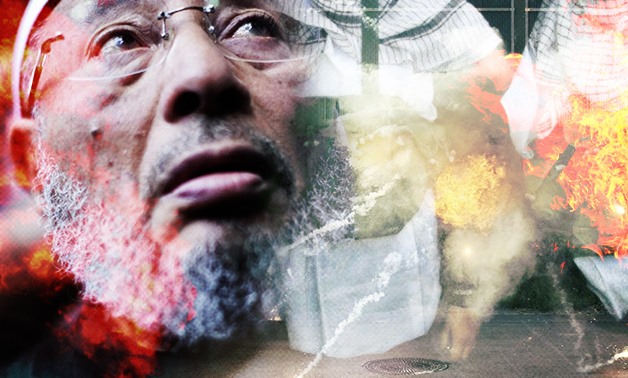
Qatar-based Al-Qaradawi is considered one of the most controversial clerics in the Gulf and Arab regions, mainly for his provision of intolerance and violent fatwas – Photo: Egypt Today/Mohamed Zain
CAIRO – 10 November 2018: Sheikh Yusuf Al-Qaradawi on Saturday declared that he will be stepping down from his position as president of the International Union of Muslim Scholars (IUMS).
As he delivered a speech at the opening session of the 5th general assembly in Istanbul, Al-Qaradawi said that this would be the last time he will chair the meeting.
Qatar-based Al-Qaradawi is considered one of the most controversial clerics in the Gulf and Arab regions, mainly for his provision of intolerance and violent fatwas (a ruling on a point of Islamic law).
On Wednesday, the Union elected the Moroccan Ahmad Al-Raysuni as a President of the Union, succeeding Al-Qaradawi.
More than 1,500 scholars from more than 80 countries participated in the General Assembly, the largest meeting of participants since the founding of the International Union of Muslim Scholars in 2004.
Fouad Allam, a former official at the National Security Apparatus, told Egypt Today in an interview that Qaradawi is not serious about stepping down from giving speeches, pointing out that this is not the first time he make such announcement.

“Qaradawi is a liar and will be back to giving speeches again in any occasion, because he is connected to the Qatari policy, and his speeches has nothing to do with religion because they are merely political.”
Furthermore, dissident Muslim Brotherhood former member said Al-Qaradawi started his journey claiming he calls for moderate Islam but then turned to the Muslim Brotherhood, which he described as “the den of terrorism and ignorance.”

Rabie further warned that Al-Qaradawi is known for issuing fatwas that oppose Arab regimes in favor of Qatar. He also added that he is always stirring controversy by attempting to incite against the army.
On June 9, Egypt, Saudi Arabia, the United Arab Emirates, and the Kingdom of Bahrain designated 59 individuals and 12 entities as “terrorists”, adding them to a terrorism watch list. One of the individuals included in the list is leading figure of the outlawed Muslim Brotherhood Sheikh Yusuf al-Qaradawi.

Qaradawi has been long used by the Qatari administration to issue fatwas (a ruling on a point of Islamic law) that permit terrorist actions.
In 2004, Qaradawi founded the International Union of Muslim Scholars (IUMS) in Qatar. The true intentions behind the institute’s creation became clearer a short while after its foundation.
The IUMS was founded in a bid to take over the role of Al-Azhar mosque, which is considered a beacon of moderate Islam worldwide.
In 2014, the Cabinet of the United Arab Emirates approved a list of designated terrorist organizations and groups following the implementation of Federal Law No. 7/2014 aimed at combating terrorist crimes. The IUMS was included in the list.
On May 24, 2014, investigations by the U.S. Department of State’s Counter Terrorism Bureau shed further light on the controversial Muslim scholar whose organization reportedly backed Hamas and endorsed a fatwa authorizing the murder of U.S. soldiers in Iraq.

They revealed that one year after the Iraqi insurgency began in 2003 as a response to the U.S.-led invasion, Qaradawi issued a fatwa declaring that “it is an obligation incumbent on Muslims to kill American citizens in Iraq, since they are in Iraq in order to assist the soldiers and the occupation forces”.
In October 2004, Qaradawi was mentioned among ”The Sheikhs of Death” as over 2,500 Muslim intellectuals from 23 countries signed a petition addressed to the UN to raise awareness on the use of religion for violence incitement.
Qaradawi was accused of “providing a religious cover for terrorism”.

Qaradawi’s views and controversial fatwas have cost him access to the U.S. since 1999. Moreover, in 2008, the U.K. Home Office stated that al-Qaradawi was denied a vista to enter the United Kingdom. In 2012, France also blocked the entrance of Qaradawi to the country.
The Qatar-based IUMS was also expelled from the Cairo-based International Islamic Council for Da’wah and Relief (IICDR) in December 2014 on allegations that the group mixed religion with politics and supported terrorism.

A video interview showed Qaradawi, a leading figure of the outlawed Muslim Brotherhood, articulating his permission of suicide bombing if required as a necessary tactic by a wider group and not an individual.
In an interview on the Doha-based state-funded Al-Jazeera satellite channel, the interviewer asked Qaradawi if it is permissible to bomb oneself in order to target a gathering affiliated with an oppressive regime, knowing that there will be casualties in the ranks of civilians.
Qaradawi replied that the ’norm’ in such matters is that suicide attacks are not permissible unless they are planned by a group.
“Normally, a person fights then gets killed. But to bomb oneself, the group must decide it needs this,” Qaradawi said. “If the group believes it is in need of someone to bomb himself in the midst of others, it is a necessary action,” he added.
Several suicide bombings took place in a number of countries over recent months, ISIS declared responsibility for most of the attacks.
On Palm Sunday in April 2017, twin bombings on two churches in Alexandria and Tanta took place, reaping the lives of dozens civilians and Christian worshipers.
On May 22, a suicide bomber blew himself up, killing 22 people, including seven children, at a concert by U.S. singer Ariana Grande in Manchester.
Qaradawi said the decision to conduct a suicide bombing should not be left to individuals only.
“You have to act within the limits of what the group demands,” Qaradawi stressed. “The group deploys individuals depending on its needs and depending on the demands, but individuals do not act on their own.”
Comments
Leave a Comment